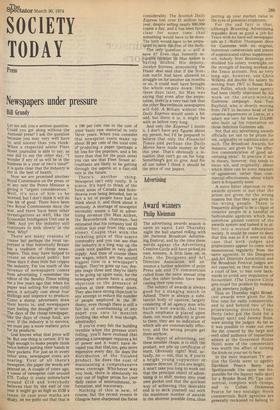Press
Newspapers under pressure
Bill Grundy
Let me ask you a serious question. Could you get along without the national press? I ask the question because you may very well have to, and sooner than you think. When a respected senior Fleet Street journalist is able to say, as one did to me the other day, "I wonder if any of us will be in the business in a year or two's time?" it is quite clear that the industry is not in the best of health.
Now we are promised another Royal Commission on the press, or at any rate the Prime Minister is giving it "urgent consideration." Well, it's nice of him to be worried, but I don't think it will do one bit of good. There have been two Royal Commissions since the War, and there have been other investigations as well, like the Economist Intelligence Unit one in 1966. And yet the industry still continues to sink slowly in the west. Why?
There are many reasons of course but perhaps the most imPortant is that historically Britain has a tradition of cheap newsPapers. This may have helped to create an educated public, but these days it does little but cripple the industry. Far too much of the revenue of newspapers comes from advertising. I remember the editor of the Sunday Times telling me a few years ago that when his Paper was selling for nine (old) Pence, it actually cost about four Shillings and sixpence to produce. Come a slump, advertisers draw their horns in, and newspapers start feeling the draught at once. The days of the cheap newspaper, like the days of cheap food, are over. If the industry is to survive, we must pay a more realistic price for its products.
God knows what that price will be. But one thing is certain. It'll be high enough to make people think twice before putting their hands in their pockets. For just as in 'every Other area, newspaper costs are soaring. First of all there's newsprint, the paper the words are Printed on. A couple of years ago, a tonne of newsprint cost around £75. Today it costs somewhere around £110 and everybody believes that by the end of the Year it might go as high as £150 a tonne. In case your maths are Shaky, let me point out that that is a 100 per Cent rise in the cost of your basic raw material in only three years. When you consider that newsprint costs make up about 30 per cent of the total cost, of producing a paper (perhaps a bit less for the populars, and a bit more than that for the posh ones) you can see that Fleet Street accountants are likely to be getting through the aspirin at a fair old rate in the future.
There's another thing. Newsprint isn't only costly. It is scarce. It's hard to think of the forest areas of Canada and Scandinavia ever being denuded, but in fact a lot of people have had to think about it, and think about it seriously. A shortage of newsprint inevitably means a fall in advertising revenue (Sir Max Aitken, the Beaverbrook chairman, has estimated that his company lost £2 million last year from this cause alone). Couple that with the rocketing price of this scarce commodity and you can see that the industry is a long way up the creek with paddles in very short supply. And then of course there are wages, which are the second biggest item in a newspaper's budget. They've gone up too, despite stage three and they're likely to be going up. again soon, for the newspaper unions have a strong objection to the presence of wolves at their members' doors. They also have strong objection to any attempt to reduce the number of people employed in the industry, even though there is still a fair bit of overmanning of. any paper you care to mention (nothing like what it was though, admittedly).
If you've every felt the building tremble when the presses start rolling, you'll have realised that printing a newspaper requires a lot of power and it won't have escaped you that that too, gets more expensive every day. So does the distribution of the finished product. So does the cost of maintaining a comprehensive news coverage. Whichever way you look, there is absolutely no way out of higher prices for your daily ration of entertainment, information, and inaccuracy.
Nothing of this is new, of course, but the recent events in Glasgow have sharpened the focus considerably. The Scottish Daily Express lost over £1 million last year, despite selling nearly 600,000 copies a day, and it has been fairly clear for some time that something would have to be done. The limb would have to be amputated to save the rest of the body.
The only question is — will it save it? Even that formerly incurable optimist Sir Max Aitken is having doubts. His deputy, Jocelyn Stevens, announcing the Fraser deal said that if the Scottish outfit had been allowed to struggle on foranother six months or so, it could well have brought the whole empire down. Only three days later, Sir Max was saying that even after the amputation, thei-eis a very'real risk that the otherBeaverbrook newspapers will fold. A Britain without the Daily Express would seem a bit odd, but there it is; it might be with us before very long.
And only the Express? I doubt it. I don't have any figures about my person, but I'd be prepared to believe that only the Financial Times and perhaps the Daily Mirror have made money so far this year. That's obviously a situation that can't go on for long. Something's got to give. And for all our sakes I think it should be the price of our papers.


































 Previous page
Previous page